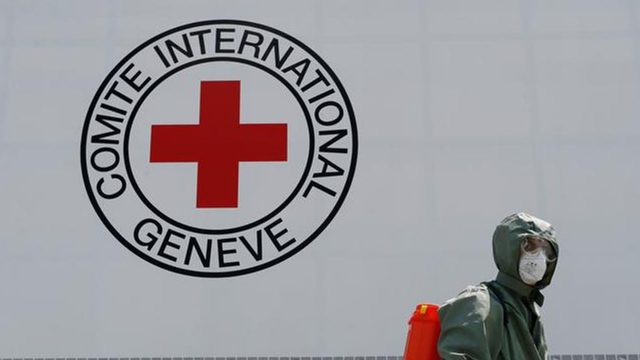FILE PHOTO: A specialist wearing protective gear walks to spray disinfectant on a truck of the International Committee of the Red Cross (ICRC) at a checkpoint on a way linking Ukrainian government-controlled territory and the self-proclaimed Donetsk People’s Republic, near the settlement of Olenivka in Donetsk Region, Ukraine June 25, 2020. REUTERS/Alexander Ermochenko
International Committee of Red Cross (ICRC) has tasked journalists to always report humanitarian issues emanating from conflicts objectively in line with International Humanitarian Law (IHL) to enjoy protection.
The Communication Field Officer of ICRC, Jos sub-delegation, Patience Nanklin-Yawus, made the call during presentations at a two-day training organised for journalists from 10 states of the federation on Thursday in Jos, Plateau.
She said journalists should always maintain neutrality, impartiality and independence while reporting humanitarian issues as they would be covered by IHL.
Nanklin-Yawus explained that the IHL as contained in the Geneva Convention stipulated that civilians which journalists are part of, as well as civilians should not be attacked during conflicts.
She said the rules of engagement also protects women, children and healthcare workers among others who are not part of the conflicts.
Nanklin-Yawus explained that the moment a journalist, through his report or action shows to be taking sides, such a journalist loses his or her protection under the IHL.
She said a journalist reporting conflicts who hitherto enjoys protection under IHL becomes vulnerable and loses his protection immediately it is discover that he is no longer neutral, impartial and independent.
Nanklin-Yawus noted that journalist’s number one priority in humanitarian reporting is to ensure that victims gets assistance irrespective of the victims ethnic, religion or political affiliation.
She advised media professional to rise above all sentiments, even if they were affected by conflicts to de-escalate the already bad security situations.
On his part, Aliyu Dawobe, Public Communication Officer ICRC Abuja, said experience over the years revealed that parties deliberately attack civilians, journalists, medical personnel and facilities contrary to the provisions of IHL.
He explained that based on the data available to them, 1, 402 journalists were killed across the world from 1992 to 2021 in conflicts related situations.
He added that a lot of medical personnel, as well as medical facilities, were equally attacked, destroyed and looted in places affected by conflicts in violation to the IHL.
He said that the attacks on medical personnel and facilities has made it difficult for victims of conflicts to get humanitarian support in some of the affected places.
Dawobe, therefore, appealed to both state and non-state actors engaged in conflicts to respect IHL to enable victims, the wounded as well as the sick get humanitarian support.
Participants at the training are journalists in prints, electronic and online media organisations from Nasarawa, Plateau, Benue, Kastina, Bauchi, Kano, Yobe, Zamfara, Kaduna and Sokoto states.
By NAN
Kindly share this story:

